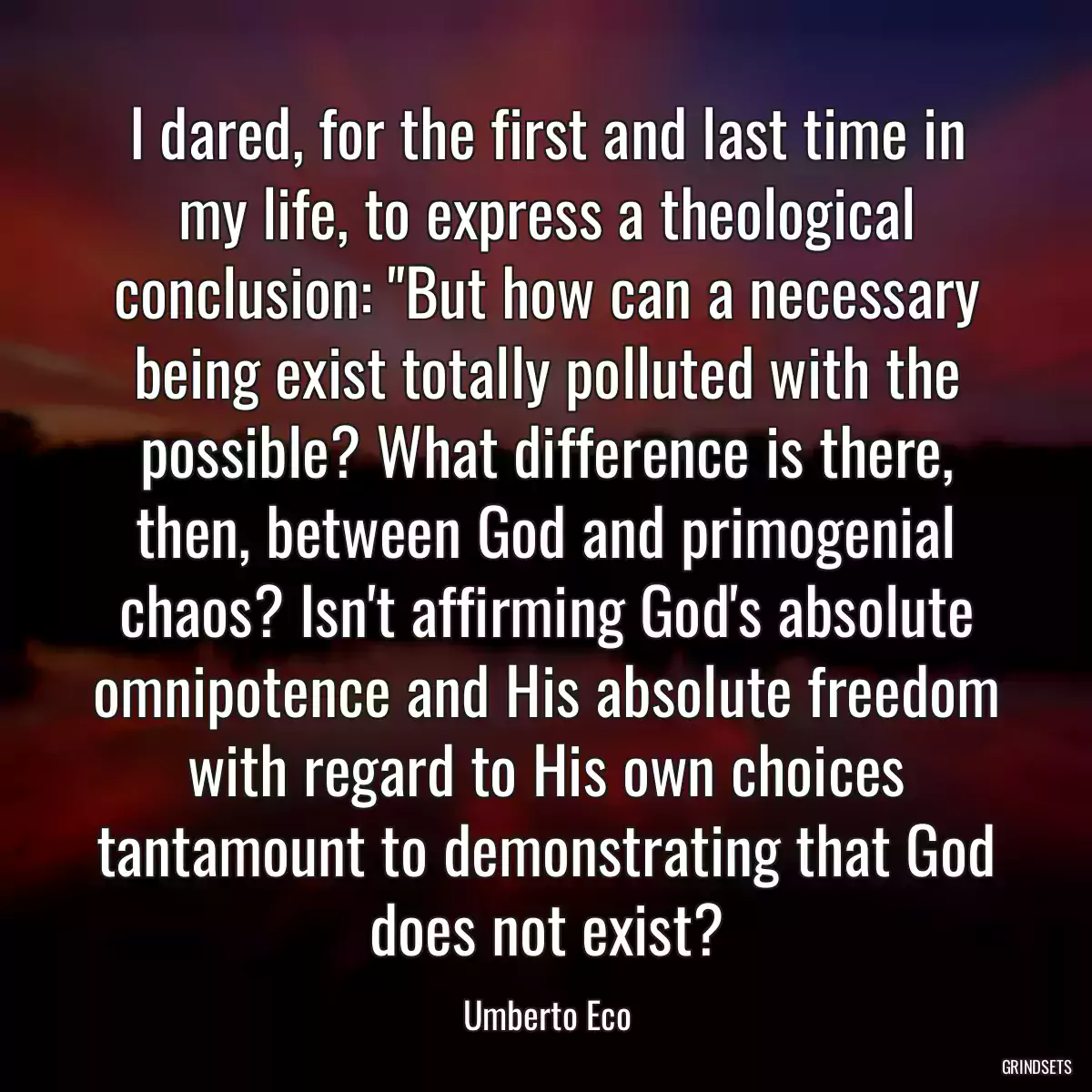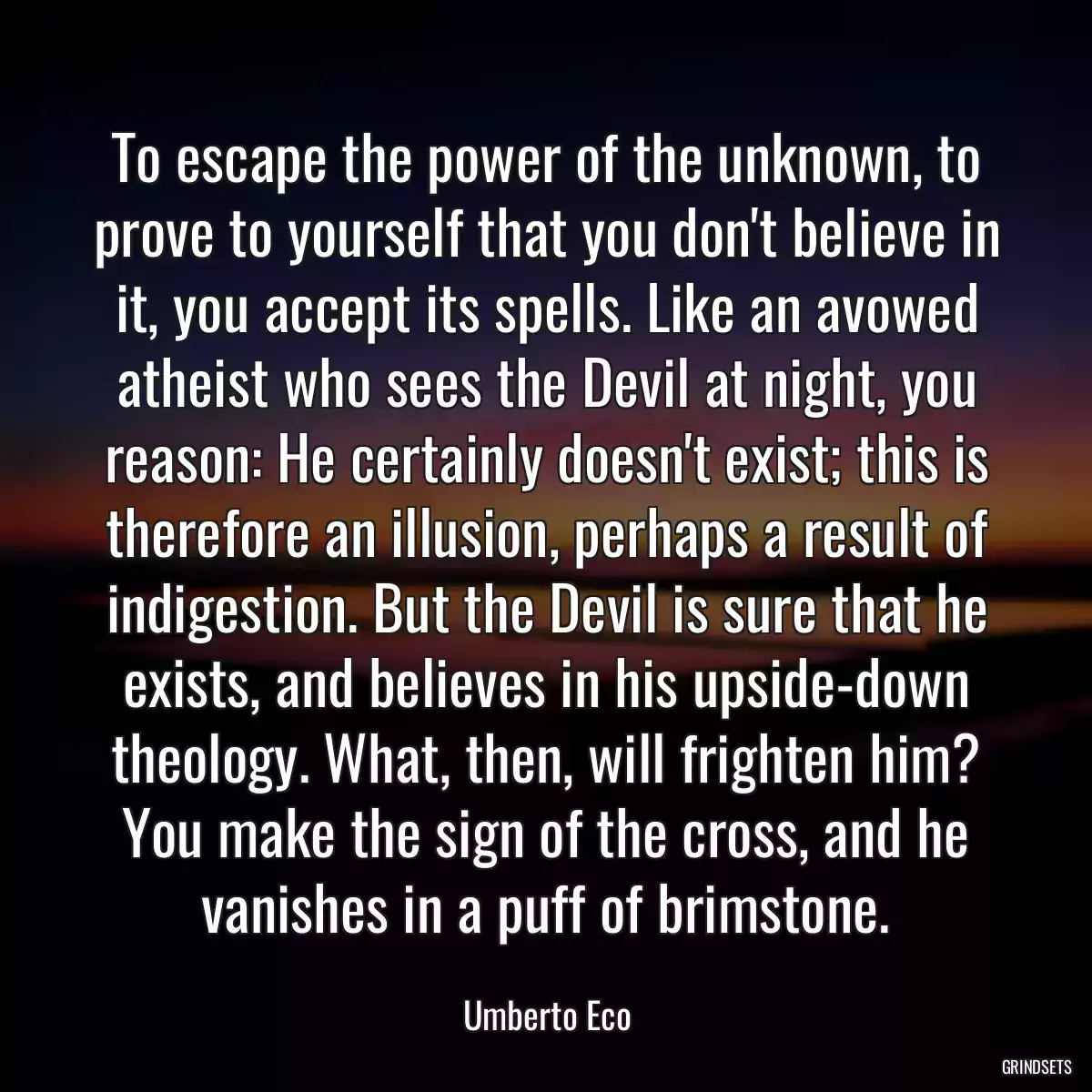
Quotes Umberto Eco
Find dozens of Umberto Eco with images to copy and share.

The older I grow and the more I abandon myself to God's will, the less I value intelligence that wants to know and will that wants to do; and as the only element of salvation I recognize faith, which can wait patiently, without asking too many questions.
Then we are living in a place abandoned by God," I said, disheartened. "Have you found any places where God would have felt at home?" William asked me, looking down from his great height.
For what I saw at the abbey then (and will now recount) caused me to think that often inquisitors create heretics. And not only in the sense that they imagine heretics where these do not exist, but also that inquisitors repress the heretical putrefaction so vehemently that many are driven to share in it, in their hatred for the judges. Truly, a circle conceived by the Devil. God preserve us.
You may also like
They say that a cat, if it falls from a window and
hits its nose, can lose its sense of smell and then, because cats live by
their ability to smell, it can no longer recognize things. I'm a cat that hit
its nose.
My generation knew pretty well what happened 50 years before our birth. Now I follow all the quiz programs because they are a paramount example of the span of memory of the young generation - they are able to remember everything that happened in their life but not before.
After so many years even the fire of passion dies, and with it what was believed the light of the truth. Who of us is able to say now whether Hector or Achilles was right, Agamemnon or Priam, when they fought over the beauty of a woman who is now dust and ashes?
You always want someone to hate in order to feel justified in your own misery. Hatred is the true primordial passion. It is love that's abnormal. That is why Christ was killed: he spoke against nature. You don't love someone for your whole life - that impossible hope is the source of adultery, matricide, betrayal of friends ... But you can hate someone for your whole life - provided he's always there to keep your hatred alive. Hatred warms the heart.
Absence is to love as wind is to fire: it extinguishes the little flame, it fans the big.

I dared, for the first and last time in my life, to express a theological conclusion: "But how can a necessary being exist totally polluted with the possible? What difference is there, then, between God and primogenial chaos? Isn't affirming God's absolute omnipotence and His absolute freedom with regard to His own choices tantamount to demonstrating that God does not exist?
Beauty has never been absolute and immutable but has taken on different aspects depending on the historical period and the country
And we, inhabitants of the great coral of the Cosmos, believe the atom (which still we cannot see) to be full matter, whereas, it too, like everything else, is but an embroidery of voids in the Void, and we give the name of being, dense and even eternal, to that dance of inconsistencies, that infinite extension that is identified with absolute Nothingness and that spins from its own non-being the illusion of everything.
By means of the sign, man frees himself from the here and now for abstraction.
The Art of the Romance, though warning us that it is providing fictions, opens a door into the Palace of Absurdity, and when we have lightly stepped inside, slams it shut behind us.
What is love? There is nothing in the world, neither man nor Devil nor any thing, that I hold as suspect as love, for it penetrates the soul more than any other thing. Nothing exists that so fills and binds the heart as love does. Therefore, unless you have those weapons that subdue it, the soul plunges through love into an immense abyss.
[In my writing] I know that I have made a caricature out of [others' academic] theories [but] I think that caricatures are frequently good portraits.
When I went from being an academic to being a member of the community of writers some of my former colleagues did look on me with a certain resentment.
And when someone suggests you believe in a proposition, you must first examine it to see whether it is acceptable, because our reason was created by God, and whatever pleases our reason can but please divine reason, of which, for that matter, we know only what we infer from the processes of our own reason by analogy and often by negation.
You may also like

To escape the power of the unknown, to prove to yourself that you don't believe in it, you accept its spells. Like an avowed atheist who sees the Devil at night, you reason: He certainly doesn't exist; this is therefore an illusion, perhaps a result of indigestion. But the Devil is sure that he exists, and believes in his upside-down theology. What, then, will frighten him? You make the sign of the cross, and he vanishes in a puff of brimstone.
Stopgaps do belong to the internal economy of the form, since the Whole requires them, even if only in a subordinate position ... The stopgap Luigi Paryson's 'zeppa' accepts its own banality, because without the speed that the banal allows up, it would slow up a passage that is crucial for the outcome of the work and its interpretation.